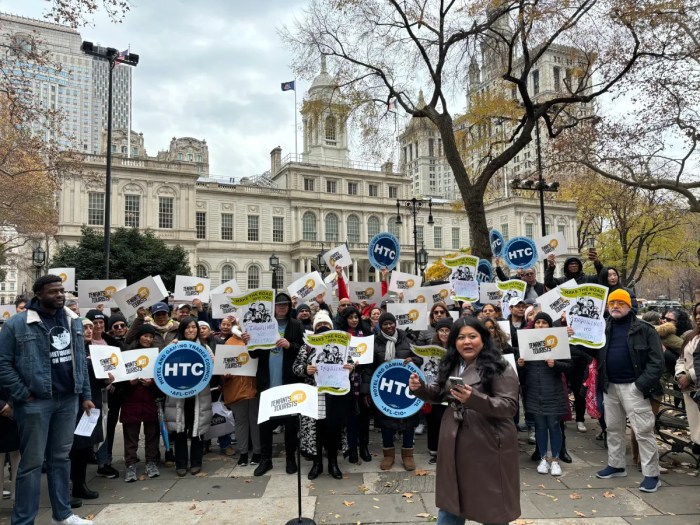By Bill Parry
Mayor Bill de Blasio came to Long Island City Monday to take part in a ceremonial groundbreaking for the second phase of the mammoth Hunters Point South housing development.
Calling it an important step to addressing the city’s affordability crisis, de Blasio said the project would produce almost 3,000 new apartments, 60 percent of them affordable for middle-class New Yorkers.
“What I hear from people all over the city is the biggest issue on their minds is being able to stay in the city they love, being able to stay in the neighborhood they love, being able to afford a place to live,” de Blasio said. “And what they want to see from all of us in government is big solutions. Well, I’ll tell you it doesn’t get bigger than Hunters Point South.”
The second, $99 million phase of construction includes infrastructure such as sewers, water main and utility work, new streets and an 11-acre waterfront park that will have a dramatic promontory overlooking the East River. When finished, Hunters Point South will be comprised of nearly 5,000 apartments and 100,000 square feet of retail and community space.
“We’re building a new neighborhood from the ground up, from its streets to its parks to its transit,” de Blasio said. “This is going to be the biggest affordable housing project built in a generation, and it’s going to ensure that this corner of Queens – despite all the market pressures driving up rents—will remain a diverse place for working people.”
State Sen. Michael Gianaris (D-Astoria) said the project will maintain the character of Long Island City by “keeping it from being affordable only for the wealthy.” City Councilman Jimmy Van Bramer (D-Sunnyside) and state Assemblywoman Catherine Nolan (D-Ridgewood) warned that multiple new schools would be necessary to accommodate the dramatic increase in population the complex will bring.
Elsewhere on the housing front, the mayor announced last week an unprecedented investment by the city that will generate 15,000 units of supportive housing over the next 15 years. The sweeping $2.6 billion plan will target homeless veterans, survivors of domestic violence, and street homeless individuals for affordable housing with supportive services, including both mental and physical health-care access, alcohol and substance abuse programs, and other social services.
“Every person in supportive housing and on the road to wellness is one fewer person in a city hospital, prison or shelter,” de Blasio said. “By making this historic investment, we are confronting the moral crisis of homelessness and mental illness our city faces today.”
Of the total capital costs, nearly $1 billion will come from the city. The rest of the cost will be covered by a combination of federal tax credits and private funding, not state funds. Months of negotiations between the de Blasio administration and Gov. Andrew Cuomo on extending the program called “New York-New York” collapsed after nearly 25 years of cooperation.
The city and state had worked together to provide supportive housing for the homeless but Cuomo should pay a bigger share of the costs. Now the de Blasio administration is going it alone.
“Let’s be clear, the city of New York is acting. We’re acting decisively,” de Blasio said. “We are not waiting on Albany.”
Reach reporter Bill Parry by e-mail at bparr



































